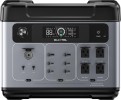Add to comparison |  |  |
|---|---|---|
| Oukitel P2400E | Oukitel P2001 Plus | |
| Expecting restock | Compare prices 2 | |
| TOP sellers | ||
| In box | charging station | charging station |
| Rated power | 2400 W | 2400 W |
| Peak power | 4800 W | 4800 W |
| Output waveform | sinusoid (PSW) | sinusoid (PSW) |
| UPS function | ||
Outputs | ||
| Sockets (230 V) | 4 | 4 |
| USB A (quick charge) | 2x QC3.0 18 W | 2x QC3.0 18 W |
| USB C | 4 pcs 5 A 100 W | 4 pcs 5 A 100 W |
| Car cigarette lighter | ||
Inputs (station charging) | ||
| From solar panels | ||
| Input port XT60 | ||
Battery and charging time | ||
| Battery type | LiFePO4 | LiFePO4 |
| Battery capacity | 2048 W*h | 2048 W*h |
| Charging cycles | 3500 | 3500 |
| Charging time (socket) ≈ | 90 min | 60 min |
| Charging time (solar panel) ≈ | 150 min | 165 min |
| Charging power (socket) | 1800 W | 1800 W |
| Charging power (solar panel) | 1000 W | 500 W |
General | ||
| Smartphone synchronization | Bluetooth and WiFi | Bluetooth and WiFi |
| PSU | built into the body | built into the body |
| Display | ||
| Backlight | ||
| Carrying handle | ||
| Operating temperature | 0 °C ~ +40 °C | 0 °C ~ +40 °C |
| Dimensions | 399x285x330 mm | 399x286x320 mm |
| Weight | 21.5 kg | 22 kg |
| Warranty | 2 years | 3 years |
| Added to E-Catalog | march 2025 | september 2024 |
The Oukitel P2400E and Oukitel P2001 Plus charging stations have similar specifications, such as a rated power of 2400 W and a peak power of 4800 W. However, differences in their functionality and charging time may influence user choice. The P2400E charges from a socket in about 90 minutes, while the P2001 Plus requires only 60 minutes to charge up to 80%. Meanwhile, the charging power from a solar panel is 1000 W for the P2400E and 500 W for the P2001 Plus. Both devices support smartphone synchronization and have a similar number of outputs, but the P2001 Plus offers a longer warranty of 3 years compared to 2 years for the P2400E. Overall, the P2001 Plus may be preferable for those who value faster charging time and a longer warranty.